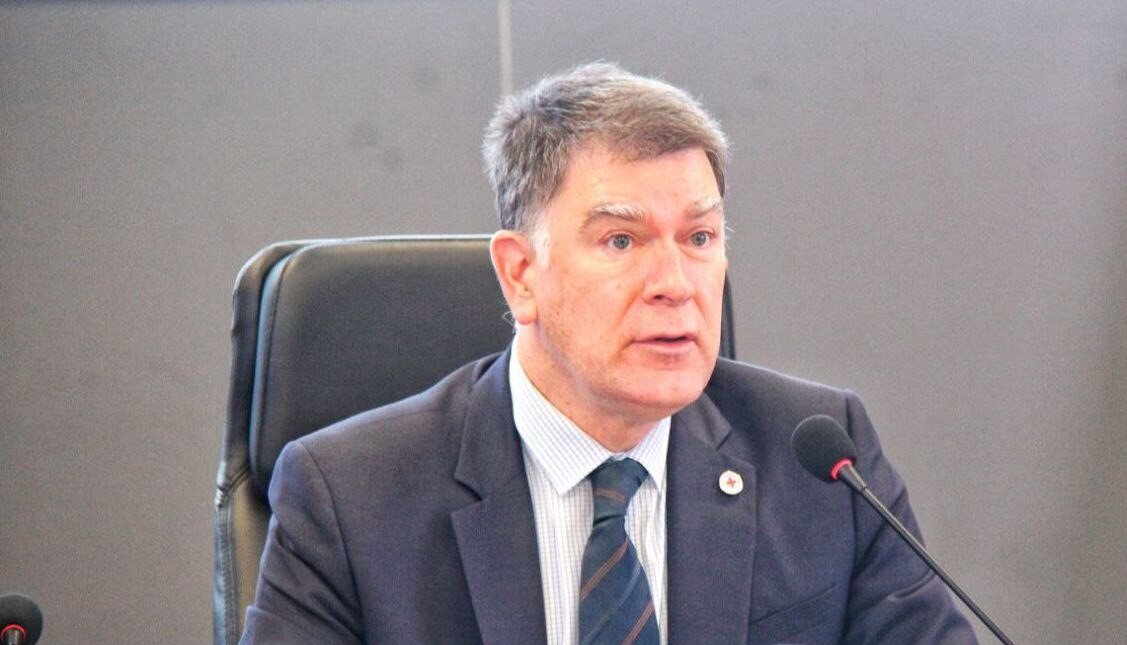IRCS hosts workshop to underscore rehabilitation

TEHRAN – The Iranian Red Crescent Society (IRCS), in cooperation with the International Federation of Red Cross and Red Crescent Societies (IFRC) and the International Committee of the Red Cross (ICRC), has held a workshop on the vital importance of rehabilitation.
“Rehabilitation is not just about providing medical services. It restores lives,” the head of the IFRC delegation in Iran, Faisal Mahboob, said.
“We are here since we have a shared mission that is helping people to regain dignity, independence, and hope through health and rehabilitation,” the IRCS website quoted Mahboob as saying.
The official made the remarks online while addressing a workshop on becoming familiar with the International Red Cross and Red Crescent Movement services in the treatment and rehabilitation sectors, on Monday.
“Leadership in the Red Cross and Red Crescent is not limited to titles or positions. Leadership is the choices we make in tough moments, the role models we set for our teams, and the joy we bring to every decision. As healthcare providers and professional leaders, you are at the heart of this mission. You ensure that our response is not only immediate, but sustainable and comprehensive,” he noted.
The official went on to say that “Strategy 2030 reminds us of three key priorities: strengthening local measures so that societies can rely on their strengths and capabilities, investing in the future so that young people and volunteers get ready for leadership, and promoting collaborative efforts since no one society can face a crisis alone.”
Keep it in mind that leadership is not about being in charge, but being a source of inspiration to others, giving hope, and taking action when it matters most, Mahboob further noted.
Attending the workshop, Vincent Cassard, the representative of the International Committee of the Red Cross (ICRC) in Iran, said, “This initiative highlights our joint commitment and mutual understanding within the International Red Cross and Red Crescent Movement; it underscores the critical role we play in delivering humanitarian action.”
“The workshop does not just aim to introduce the movement; it serves as an opportunity to think together about what binds us and what makes it possible to provide essential services to those in need.”
Health care and rehabilitation professionals have a special responsibility. You put our principles into practice every day, whether through ensuring access to quality healthcare, rehabilitation (for people with disabilities), or responding to emergencies, the official added.
The workshop aims to enhance your understanding of the foundations of the Movement. Our fundamental principles are international humanitarian law, the duties and missions of the Red Cross, the Federation, and national societies. But it is equally important to consider how these principles directly impact your daily work as health professionals.
These concepts are crucial in ensuring equal access to medical care, preserving neutrality in times of conflict, and human dignity in the most difficult circumstances.
The challenges you face are not just medical, but also humanitarian and ethical. In times of crisis, hospitals, clinics, and rehabilitation centers can quickly become places where humanity is put to the test.
Based on our principles, our unity means humanity, impartiality, neutrality, independence, volunteer service, oneness, and universality. It goes beyond words and becomes a compass that guides us and ensures that the people we serve can trust us.
Significance of rehabilitation in humanitarian missions
Addressing the event, Razieh Alishvandi, the director of the IRCS for international affairs, underscored the importance of rehabilitation in relief and rescue services, considering it an essential part of supporting those affected by crises.
Rehabilitation means restoring life, mobility, personal independence, and psychological peace to those affected by the crisis. Without physical and psychological rehabilitation, the life-saving cycle will remain incomplete, the IRCS quoted Alishvandi as saying.
Highlighting the IRCS’s experiences in providing rehabilitation services to war veterans, natural disaster victims, and patients suffering from hard-to-cure illnesses, the official said the IRCS has made a significant contribution to the advancement of rehabilitation through establishing specialized treatment and rehab centers.
“No single country can tackle the consequences of crises. However, with global solidarity and cooperation, we can support those in need through difficult times. Rehabilitation is not just limited to treating physical injuries, but also restoring self-esteem and hope for life,” she further noted.
For his part, Hamid-Reza Dehqan, an official with the IRCS, announced the IRCS’s readiness to foster international cooperation in rehabilitation sectors with other societies.
The workshop aims to strengthen understanding of the foundations of the movement and uphold the principle of neutrality in conflict situations. This neutrality is the main foundation of our activities, whether in ensuring equal access to medical services or in preserving human dignity in the most difficult circumstances, the official noted.
The workshop serves as a valuable opportunity for the expansion of joint interactions with the International Federation of Red Cross and Red Crescent Societies and to implement projects in various fields, particularly mental health. Despite limitations, the positive outcomes in the treatment sector show that society is moving in the right direction.
MT/MG
Photo: Vincent Cassard, the representative of the International Committee of the Red Cross (ICRC) in Iran, attended the workshop.
Leave a Comment